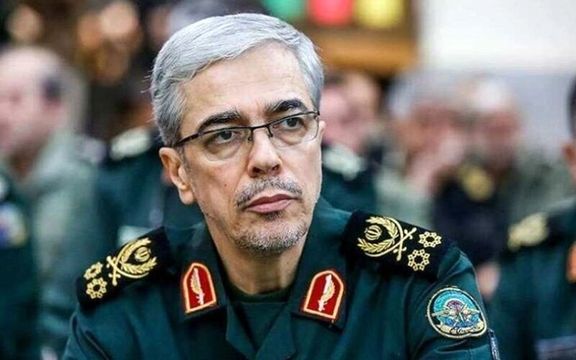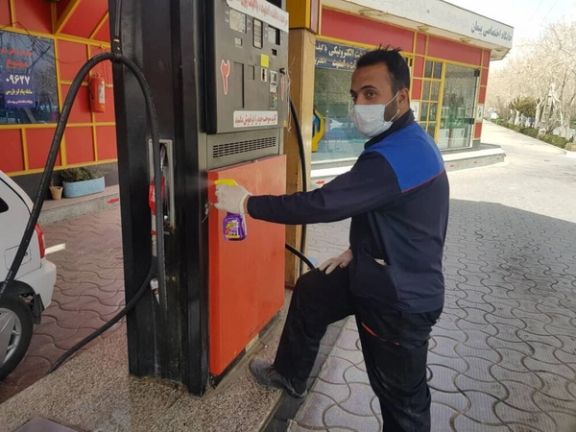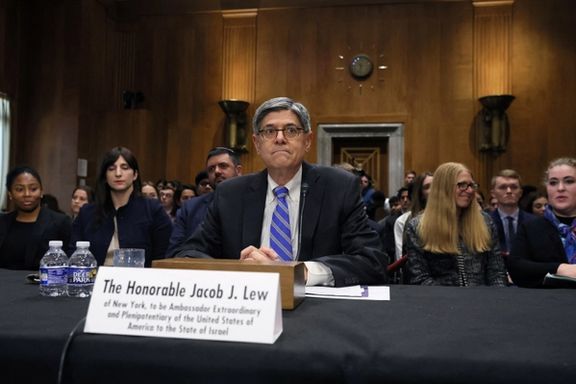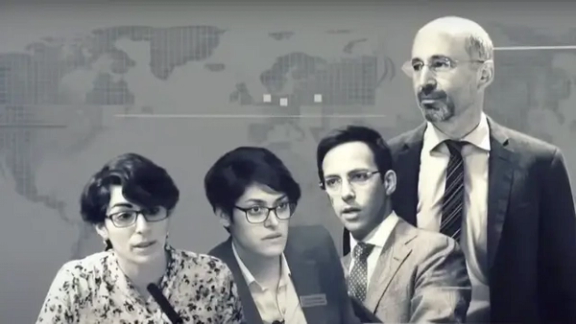Mahsa Amini Wins EU's Prestigious Sakharov Prize

This year's Sakharov Prize has been posthumously awarded to Mahsa Amini, who died last year in the custody of morality police, sparking the greatest ever challenge to the Iranian regime.

This year's Sakharov Prize has been posthumously awarded to Mahsa Amini, who died last year in the custody of morality police, sparking the greatest ever challenge to the Iranian regime.
The prize is awarded by the European Parliament to individuals and groups for defending freedom of thought and human rights.
EU Parliament President Roberta Metsola said that 22-year-old Amini's death "marked a turning point," the Women, Life, Freedom uprising which followed, posing the gravest challenge to the regime since it came to power in 1979.
Arrested for not wearing her hijab properly, Amini was found to have been dealt severe blows to the head, though the regime never acknowledged responsibility nor brought the culprits to justice.
"It has triggered a women-led movement that is making history," Metsola said, adding that the movement stood for "dignity and freedom in Iran."
She said that the award was a tribute to the brave women, men and young people of Iran who are leading the push for change in a revolution which has seen the deaths of hundreds in the hands of brutal regime security forces and tens of thousands more arrested.
Amini hailed from the predominantly Kurdish city of Saqez in western Iran.
The Sakharov prize is named in honor of Soviet physicist, political dissident and 1975 Nobel Peace Prize laureate Andrei Sakharov.
Last year, the Sakharov Prize was awarded to the Ukrainian people for protecting democracy, freedom and rule of law following Russia's invasion which continues to today.

The results of a recent poll show that high rents and skyrocketing home prices are the main concern among the residents of the Iranian capital Tehran.
Donya-e-Eqtesad, an Iranian economic newspaper, reported that based on the responses of the participants in this poll, low incomes and very high inflation top the concerns of respondents after the high cost of housing.
According to the poll findings, half of the household income in Tehran is spent on rent, with every family paying 150,000,000 rials (approx. $300) on average for rent.
This is while more than 50 percent of the participants said that their income is less than 160,000,000 rials (approx. $320) per month.
Related figures also indicate that nationwide, 39 percent of household incomes is spent on housing on average, Donya-e-Eqtesad quoted Ali Farnam, an official in the research center of the Iranian parliament as saying.
According to international standards, the optimal housing cost is considered to be 30 percent of the household income at most.
Farnam added that high real estate prices relative to incomes is the main reason behind the rise of rents in Iran.
This obstacle can only be removed if real growth in household income is achieved via optimal and continuous economic growth, Farnam pointed out.
Wages in Iran have sharply declined in relative terms as the country has experienced above-40-percent inflation in the past three years. The Iranian currency has fallen 12-fold since 2018, when the United States withdrew from the JCPOA nuclear accord and imposed sanctions on Iran.

Mohammad Bagheri, the Chief of Staff of Iran's Armed Forces, has continued regime criticism of Israel's reprisal attacks in Gaza after its proxy Hamas declared war on the Jewish state on October 7.
In a phone call with Russian Defense Minister Sergey Shoigu, General Bagheri said, "We are profoundly concerned about the continuation of widespread and brutal crises against civilians. Such ruthless behavior is intolerable, and independent governments should react seriously to it."
Defense Minister Shoygu underscored Russia's stance on the need for a ceasefire and the protection of civilian lives in the region, IRNA state news agency reported.
Russian Foreign Minister Sergei Lavrov also expressed concerns about the Gaza conflict potentially spreading into a regional crisis, according to Interfax news agency. He also described attempts to blame fellow sanctioned nation and war ally Iran for the crisis as provocations.
The comments come as regime officials in the political and military domains continue to fan the flames of unrest, threatening to activate its proxies on Israel's borders.
Just days ago, the semi-official Fars news agency reported Iranian foreign minister Hossein Amir-Abdollahian warning, "If the Zionist aggressions do not stop, the hands of all parties in the region are on the trigger".
Iran provides financial support and weapons to groups such as Hamas, which is designated as a terrorist organization by both the United States and the European Union. Iran also supports Hezbollah, a Lebanese militia group known for its periodic confrontations with Israel, situated on its northern border.
Iran has claimed that any Israeli reprisal attacks, which have resulted in casualties in Gaza, will be met with a response from what Iran refers to as the "axis of resistance." The coalition includes anti-Israeli and anti-Western groups in Lebanon, Syria, Iraq, and Yemen.

Javad Owji, Iran's Minister of Petroleum, has publicly acknowledged that the country is grappling with a critical shortage of high-grade gasoline.
An investigation conducted by Iran International in August had revealed that the distribution of the premium gasoline in Iran plummeted by a staggering 90% in comparison to the same period last year.
High-grade gasoline, often referred to as Supercarburant in French, is a specialized type of fuel to which additives are introduced in order to enhance its octane rating, thereby improving its overall quality.
Owji, addressing the issue during a cabinet meeting on Wednesday morning, highlighted that high grade fuel like Euro 5 is being distributed during temperature inversions to mitigate air pollution.
In a conversation with Iran International, an anonymous source indicated that the inadequacy and delays in the annual maintenance of refineries are significant factors contributing to the decline in high-grade gasoline production.
Contrary to the claims made by the Minister of Petroleum, the distribution of Euro 4 and 5 standard gasoline has proven to have a limited impact on reducing air pollution, primarily due to its relatively small share in the daily gasoline consumption basket.
According to data obtained by Iran International, approximately 80% of the gasoline distributed does not meet the Euro 4 and 5 standards.
The findings indicate that gasoline production has dwindled to 100 million liters. However, the Ministry of Petroleum attempts to offset the deficit by increasing daily production to 115 million liters through the addition of non-standard and polluting substances.
Iran remains heavily dependent on revenues generated from crude oil exports, but due to international sanctions and systemic mismanagement, the country has struggled to modernize its energy sector.

Leading Senate Republicans have expressed concern over Biden’s pick for ambassador to Israel because of his role in negotiating the Iran nuclear deal in 2015.
Jack Lew was Treasury Secretary during the Obama administration, when $400 million in cash was delivered to the Iranian regime on the day of the implementation of the deal.
“He was an ATM to the Iranian Ayatollah,” said Senator John Barrasso in Lews’ confirmation hearing Wednesday. “He oversaw the ransom payment to Iran — the massive influx of cash was ultimately a direct deposit into Iran's terrorism account.”
Other Republican members of the Senate Foreign Relations Committee were no kinder to Lew –although they did admit that a new ambassador has to be confirmed as quickly as possible, given the current situation in Israel.
Senator Marco Rubio slammed Lew for issuing a special license to help Iran access the US financial system in 2016. “You put on 200 roadshows around the world, encouraging banks… and telling them ‘don’t worry about sanctions, don’t worry about penalties.”
Lew, however, defended his record related to the Iran nuclear deal, while depicting the Islamic Republic as “an evil, malign government that funds its evil and malign activities first.”
“I don't think this is the moment for us to be negotiating with Iran,” the former Secretary said, as the Biden administration has held indirect talks with the Islamic Republic throughout the year about ways to reduce tensions and possibly limit the progress in Tehran's nuclear program.
The negotiations resulted in a US agreement to allow $6 billion in frozen Iranian funds to be unblocked in exchange for the release of five Iranian Americans held hostage by Tehran. Critics called the agreement the largest ransom payment in history.
Lew was also asked if the Biden administration can guarantee that the Islamic Republic will use funds returned by the US with the lifting of additional sanctions only for humanitarian purposes.
“I can’t say that there’s no leakage,” Lew responded, “to the extent that there’s leakage, it won’t change the thrust of what they do. Sadly, supporting terrorist organizations like Hamas and Hezbollah – that’s not very expensive.”
The debate about Iran’s role in funding militant groups has become more prevalent in Washington with the Hamas attack against Israel and the release of $6 billion that currently is parked in Qatari banks and is supposed to be used only for imports of medicine by the Iranian regime.
US lawmakers have doubled their efforts to force the administration to ‘refreeze’ the $6 billion, arguing that the regime in Iran will use funds to plan and support ‘malign’ actors and activities such as Hamas and October 7 attacks on Israel.
It is against this backdrop that the Senate is assessing Jack Lew’s nomination for the ambassadorial position in Israel.
“Biden’s nom for Israel ambassador, Jack Lew, is bad for the US & our strongest ally in the Middle East” Senator Joni Ernst posted on X (formerly Twitter). “The Biden admin has already been infiltrated by Iranian spies, we should not place an Iranian sympathizer in this position.”
While Lew only needs 51 votes to be confirmed, assuming his nomination is advanced by the Senate Foreign Relations Committee, any one senator can slow the process down on the Senate floor.
Senate Democrats say that confirming a new ambassador to Israel should be one of their highest priorities. The post has been vacant
“Given the dangerous state of emergency that Israel faces, the United States needs a confirmed U.S. ambassador in Jerusalem,” said Senate Foreign Relations Chair Ben Cardin as he began the hearing.
The post has been vacant since July 2023 when Thomas Nides finished his work as US ambassador to Israel.

Former top US national security officials are asking the government to revoke security clearances for officials with “ties or sympathy for” the Iranian regime.
Semafor reported on Wednesday that senior Trump administration officials signed a statement saying, “As former senior officials in the United States Government we are very alarmed by the information contained in recent articles regarding Iranian influence operations targeting American citizens, especially US Government employees.”
Among the former officials are Secretary of State Mike Pompeo, National Security Advisor Robert O’Brien, Pentagon chief Christopher Miller, and Director of National Intelligence John Ratcliff.
The concern over potential security issues for the US government emerged when in September Iran International published a report based on a joint investigation with Semafor showing that several individuals close to, or part of the Obama and Biden administrations were acting as members of an Iranian government influence network in the United States.
“We are jointly speaking out in this unprecedented manner because of the clear and present danger Iran and its covert operations of many types, including its influence operations, pose to U.S. National Security,” the statement said.
The disclosure of an Iranian influence network has reverberated in the US Congress where many lawmakers have demanded answers from the Biden administration. In April, the security clearance of President Joe Biden’s Iran envoy Robert Malley was suspended, and he left the State Department, without being formally ousted from his position. Malley is under investigation for alleged mishandling of classified material.
Biden’s Iran policy has come under increasing scrutiny as his administration has failed to rigorously enforce US sanctions and in August agreed to release $6 billion of frozen Iranian funds.